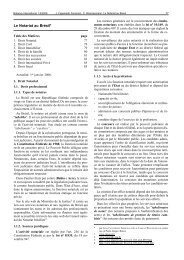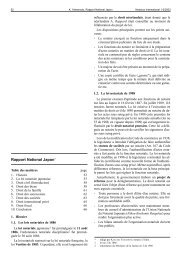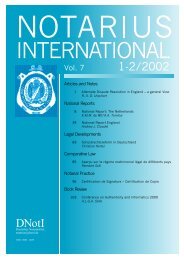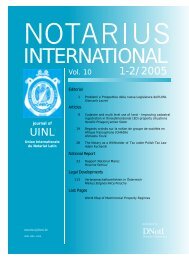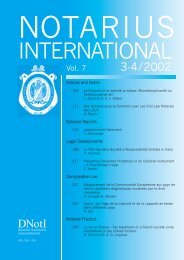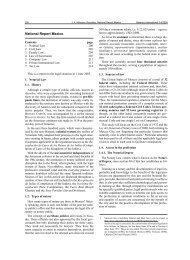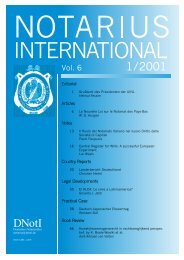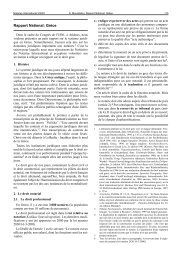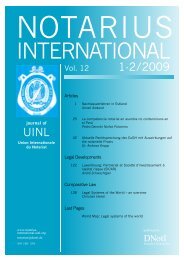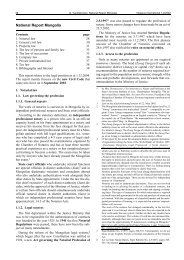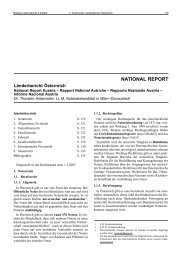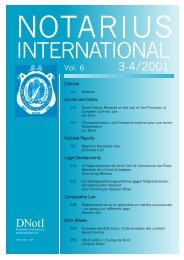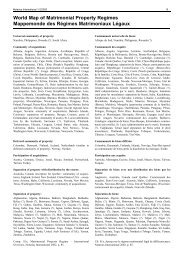You also want an ePaper? Increase the reach of your titles
YUMPU automatically turns print PDFs into web optimized ePapers that Google loves.
150 D. Ockl, Protection of the Purchaser of Immovables to be built in Italy <strong>Notarius</strong> <strong>International</strong> 3-4/<strong>2005</strong><br />
Another situation resulting in negative consequences<br />
for the purchaser in the event of the vendor’s bankruptcy<br />
may arise if the building collapses or defects manifest<br />
themselves in the property. In such a case in regard to<br />
the building contract, Article 1669 of the Civil Code provides<br />
that if, during a period of ten years from the date of<br />
completion, the construction collapses totally or in part as<br />
a result of a defect in the ground or in the construction, or<br />
presents a manifest danger of collapse or serious defects,<br />
the contractor is liable to the purchaser or his successors<br />
in title, provided that notice is given within one year of<br />
discovery of the problem. The courts have extended the<br />
scope of that legislation to others not mentioned expressly<br />
in the provision of the Civil Code, declaring it applicable<br />
to the vendor of the property whether he be an ordinary<br />
builder or constructed the property under his own<br />
direct management. 2 However, plainly such form of protection<br />
is in fact inadequate in the event of the subsequent<br />
bankruptcy of the vendor builder.<br />
3. Registration of the preliminary contract<br />
An initial form of protection of the purchaser was introduced<br />
by Legislative decree No 699 of 31 December<br />
1996, converted into Law No 30/1997. Amendments to<br />
the Civil Code laid down an obligation to register in the<br />
land registry preliminary contracts concerning real estate,<br />
even if under construction or yet to be built, if such contracts<br />
are drawn up in a public deed or in an authenticated<br />
private document.<br />
Registration confers priority: registration of the definitive<br />
contract or of any other act entailing execution of<br />
a preliminary contract or of a judgment for specific performance<br />
of a preliminary contract, overrides registrations<br />
entered against the transferor after registration of<br />
the preliminary contract (Article 2645a, second indent of<br />
the Civil Code).<br />
Moreover, under Article 2775a of the Civil Code, where a<br />
registered preliminary contract is not performed the<br />
amounts standing to the credit of the intending purchaser under<br />
the contract have special priority in regard to the property<br />
forming the subject-matter of the preliminary contract.<br />
None the less, that form of protection has proved to<br />
be inadequate inasmuch as registration of preliminary<br />
contracts is mandatory only in the case of contracts<br />
drawn up as a public deed or in the case of an authenticated<br />
private document. For a preliminary contract to be<br />
valid mere written form is sufficient without any involvement<br />
by a notary. Yet registration is not permissible<br />
in the case of a private document which is not notarised.<br />
In practice only a small proportion of preliminary contracts<br />
are drawn up in a public deed or in an authenticated<br />
private document. For reasons of cost the vast majority<br />
of preliminary contracts are drawn up privately, and<br />
are consequently not registered and do not enjoy the protection<br />
resulting from registration.<br />
4. The new legislation – scope<br />
The problem of the protection of the purchaser of immovables<br />
under construction remained unresolved and<br />
had a strong social impact. 200,000 Italian families were<br />
involved in around 9,000 bankruptcies of building companies<br />
since 1995.<br />
The new Legislative decree no 122 of 20 June <strong>2005</strong>,<br />
which entered into force on 21 July <strong>2005</strong>, seeks to respond<br />
to those protection requirements by introducing:<br />
- an obligation to provide a guarantee in respect of sums<br />
paid in advance,<br />
- minimum mandatory content for the preliminary<br />
contract,<br />
- an obligation on the vendor to deliver to the purchaser<br />
a policy against losses arising out of the building’s collapse,<br />
- an obligation to cancel or subdiivide mortgages taken<br />
out,<br />
- a right of pre-emption in favour of the purchaser in<br />
the event of compulsory execution in regard to the<br />
property,<br />
- amendments to the bankruptcy law,<br />
- a solidarity fund for purchasers of immovables yet to<br />
be built.<br />
4.1 Requirements in regard to persons concerned<br />
The requirements of the new legislation in regard to<br />
persons concerned are as follows:<br />
a) The vendor must be a builder, by which is meant<br />
the undertaking or building cooperative which is promoting<br />
the sale of or is selling an immovable yet to be built,<br />
or has entered into any other contract, including a leasing<br />
agreement, which has or may have the effect of providing<br />
for the deferred assignment or transfer to a purchaser of<br />
the property or of title to a property to be built, whether<br />
it is to be built directly by the aforementioned entities or<br />
construction is to be awarded to a contractor or in any<br />
event carried out by third parties (Art. 1 (b) of the legislative<br />
decree).<br />
b) The purchaser must be a natural person. The legislation<br />
does not therefore apply to companies or to collective<br />
bodies of any other kind (Art. 1b of the legislative<br />
decree). Moreover, initial commentators on the new legislation<br />
question whether, by using the term ‘natural person’,<br />
the legislature sought to refer to any natural person,<br />
on a literal reading of the provision, or whether, in the<br />
wake of recent legislative interventions in regard to consumer<br />
protection, that term must be taken to mean a natural<br />
person not acting in pursuance of entrepreneurial or<br />
professional activity, which would follow from a narrow<br />
interpretation of the provision.<br />
4.2 Requirements in regard to subject-matter<br />
The contract must concern immovables yet to be<br />
built, that is to say those for which building pewrmission<br />
has been sought, whether they are yet to be built or con-<br />
2 Judgement of the Cassation Court: 20 March 1998, 2977, Foro<br />
Italiano, 1998, 316; Judgement of the Cassation Court: 7 June 1994,<br />
5514, Giur. Civ. 1994, voce Appalto, p. 54, Judgement of the<br />
Cassation Court: 14 December 1993, 12304 in Foro Italiano, 1993,<br />
voce Appalto, 62.



